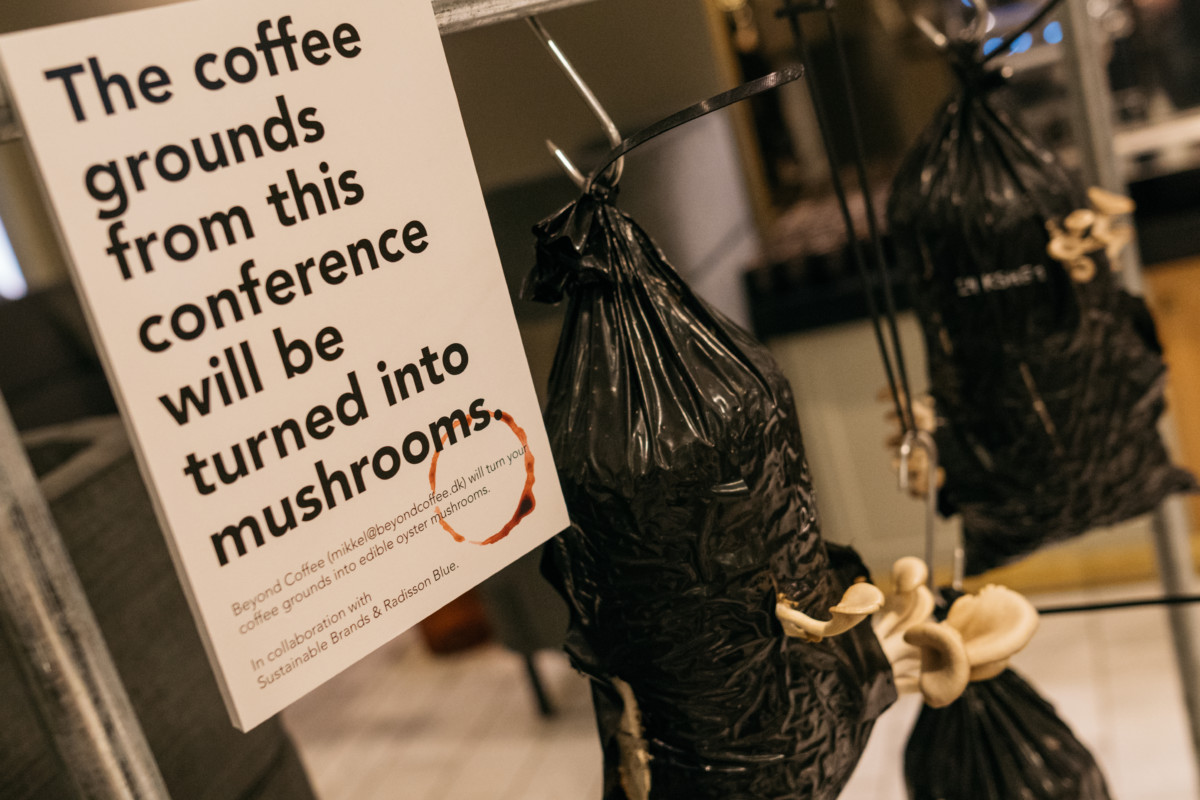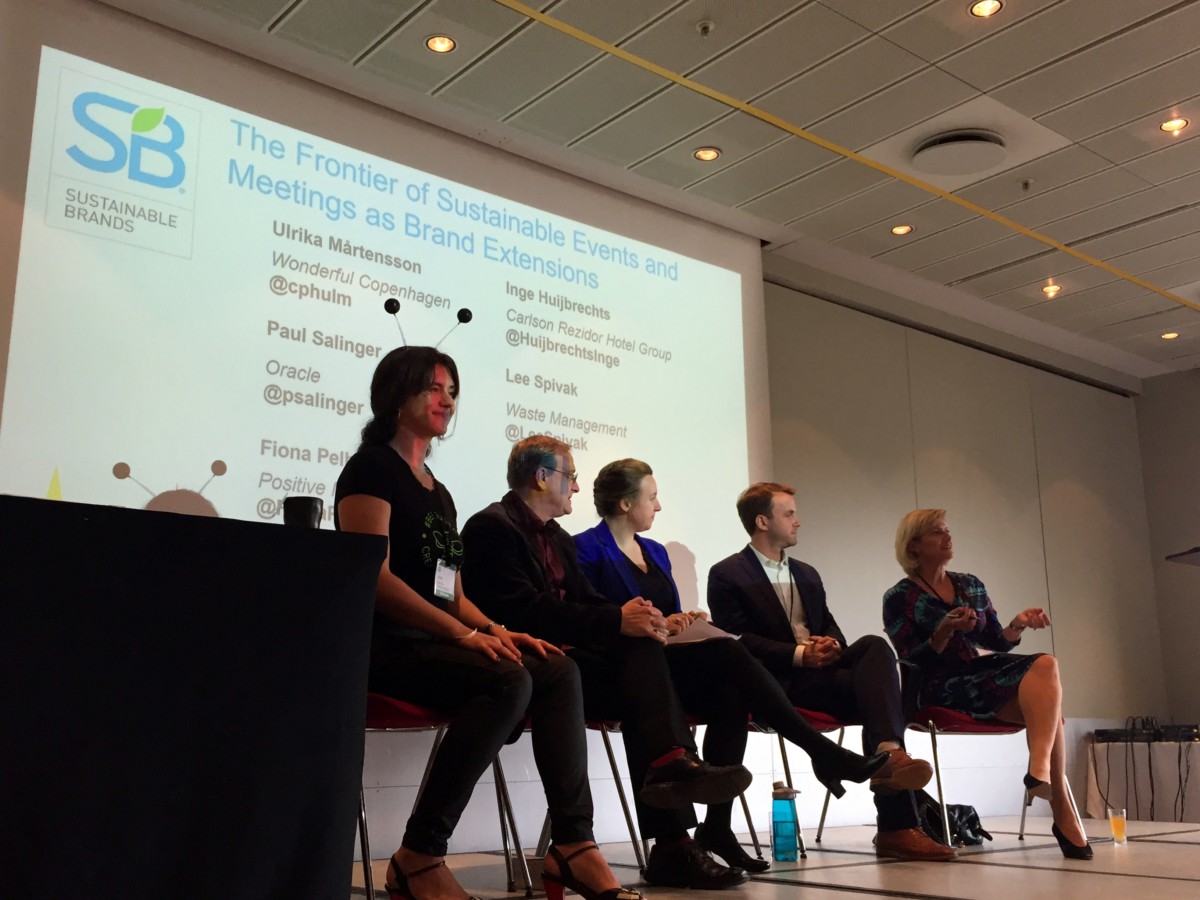At the Sustainable Brands Conference in Copenhagen sustainability went beyond the conference programme and was embedded into the event planning strategy – here is how:
Location
Copenhagen lends itself perfectly to a destination for a sustainable event. The city aims to become the first carbon neutral capital by 2025 and it is clear that the local community are on board with achieving this. It is also centrally located in Europe, making it easily accessible to delegates from many other destinations. On arrival in Copenhagen the venue, Radisson Blu Scandinavia, is 15 minutes by public transport from the airport.
Venue
As stated on their website “Radisson Blu is recognized by the Green Meeting Industry Council (GMIC) for leadership and innovative best practices in sustainable meetings’ solutions”. Wolfgang Neuman President & Chief Executive Officer of the Rezidor Hotel Group delivered a session at the conference sharing how each brand in the portfolio of hotels was taking up the challenge to become a more responsible business around youth unemployment, carbon emissions, human rights and water stewardship. The initiative that was promoted at Radisson Blu Scandinavia was Blu Planet, which focuses on reducing water waste.
The chain works with Just a Drop, the international water aid charity and donates money when guests re-use their towels to save water. Through this initiative the brand ensures a lifetime’s supply of fresh drinking water is available to over 12,000 children. When asked attendees to make a show of hands Wolfgang was impressed to see how many had participated by re using their towels. People were changing their behaviour. Radisson Blu also joined the Soap for Hope programme to recycle waste soap to help improve hygiene and prevent disease in communities that have no access to soap.
The hotel also implements further initiatives around using eco friendly cleaning products and offering water light breakfasts.

Wolfgang Neuman President & Chief Executive Officer of the Rezidor Hotel Group
Promoting well being
The conference committed not just to the well being of the planet but also the attendees. Yoga classes were on offer each morning and cycling was encouraged within the transport plans for the fringe activities, serving the dual purpose of reducing CO2 and promoting physical activity. Free bicycles were available from the hotel.
The well being of attendees was further encouraged through the food offering. The lunch menu promoted the six principles of brain food with lots of fish, wholegrain products, fruit and vegetables. Tied into this was the use of fresh, locally sourced products, reducing the carbon footprint of the event whilst also contributing to the local economy.
Reducing waste
Delegate bags were offered in a deconstructed format. Instead of putting everything in a bag for each attendee, items were left on a table for them to select on the items they wanted, therefore reducing waste. “Sprout” pencils, the world’s first sustainable pencils were offered. They are made from sustainable wood and contain a dissolvable seed capsule in the end so once finished with they can be planted. Paper was offered outside rooms for people to take if required rather than being placed on each table setting.
All event specific signage was to be sent back to the printers for recycling and all brand signage was for long term usage so would not be disposed of.
As part of the waste reduction efforts exhibitors were also encouraged to minimise waste and use eco friendly products where possible. The Google Cardboard viewers offered on Dong Energy were as sustainable as they could possibly be and if users knew of better options they were invited to suggest them. Carlson Rezidor promoted their Green Meetings initiative at their exhibition stand by offering attendees the option to help offset the carbon footprint of the event. Small flyers made from seed paper were given out and attendees were encouraged to write on them how they intended to activate their purpose. Then they were asked to plant them at the Carlson Rezidor exhibition stand. For each card planted the chain agreed to offset 1 ton of carbon and plant 1 tree in Kenya.
When it came to food waste attendees were offered smaller plates at the lunch breaks. This encouraged smaller portions, meaning that everything on their plates was eaten and food waste was reduced.
Radisson Blu and Sustainable Brands also partnered with Beyond Coffee to turn coffee grounds from the conference into edible oyster mushrooms.

Activating Purpose
Banner stands near the coffee machines in the refreshment areas promoted the Positive Cup initiative from Nespresso which aimed to promote farmer welfare and improve the sustainability of the coffee industry.
Alongside eco friendly initiatives the event also promoted the community and humanitarian initiatives within the sustainability framework. Local community initiatives were offered speaking platforms at the event to promote create business partnerships for both attendees and charities. CPH:CHANGE, a local collaborative platform for social change initiatives had the opportunity to speak to attendees with the intention of matching each of these initiatives with brands marketing strategies.
Conclusion
Sustainable Brands demonstrated how event organisers can work with suppliers to reduce any negative impacts. Sustainability strategies can be included in all events – not just those with sustainability themes. How can you ensure your next event has social, economic and environmental benefits?
Photos by Sustainable Brands




No Comments